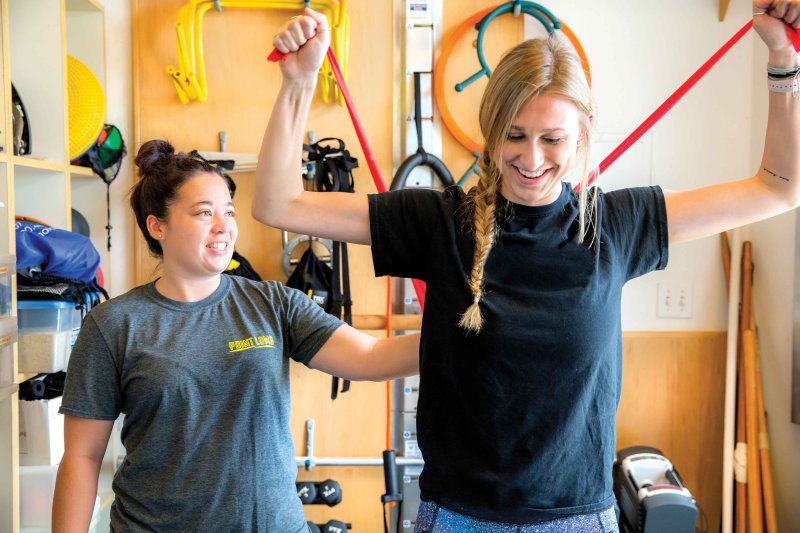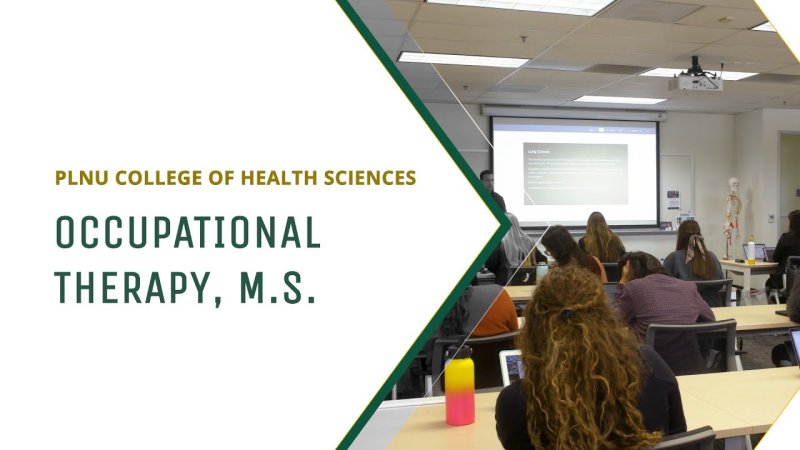
While both occupational therapy (OT) and physical therapy (PT) support patients with physical and mental health goals, there are fundamental differences between these careers including the education pathway, work environment, day-to-day tasks, as well as average pay and time commitment. Whether you’re pursuing a career in OT or PT, here’s a basic guide to help you in your career exploration.
OT and PT: The Main Similarities
The similarities between these careers are found in the skills both therapists need. Fundamental to both careers are patience, planning skills, a growth-oriented mindset, and experience. All of these are first learned in undergraduate courses. A vast majority of physical therapists and occupational therapists have similar undergraduate degrees (health sciences, biology, psychology, etc.).
Another similarity is their fundamental purpose. Ultimately, PT and OT are all about helping patients achieve individual goals set by themselves and/or their doctor to make moving and living easier.
OT and PT: The Basic Differences
Occupational therapy is much broader in the areas of support and guidance offered to patients. Moreover, the kinds of treatment for the varying patients are far-ranging. Usually centered on fine motor skills like improving hand-eye coordination, handling stressful social situations, or completing basic life skills individually (cooking, showering, writing, etc.), OT has unique plans catered to each patient’s goals.
On the other hand, physical therapy specifically focuses on treatments and growth plans that improve gross motor skills involving mobility and strength. Usually utilizing exercise equipment like treadmills, resistance bands, and weights, PT predominantly helps those recovering from physical injury and senior citizens seeking to maintain health.
Essentially (though there is some flexibility), OT focuses on helping people function independently in day-to-day living; PT focuses on recovery.
What does an occupational therapist do?
The essential job of occupational therapists, much like physical therapists, is to set a plan and help patients achieve it. However, the nuances and applications of this plan are different from physical therapists. As mentioned earlier, an occupational therapist usually works specifically with improving fine motor skills. Therefore, the work environment and day-to-day tasks look a bit different from physical therapists. Occupational therapists work in a variety of settings depending on the needs of their patients. From children to seniors, OT is something utilized cross-generationally. Therefore, work settings can be within schools, hospitals, and even residential homes.
Day-to-day tasks include organizing appointments, keeping up to date with the latest science and treatment plans, and working with patients. One-on-one work with the patients includes completing exercises that can be as simple as holding a pencil to discovering coping mechanisms for emotional/stressful stimulating scenarios.
What does a physical therapist do?
In contrast to occupational therapists, physical therapists’ treatment plans focus on physical and mobility recovery. The typical work environment is within hospitals or healthcare settings. Additionally, within private practice, physical therapists may also complete appointments at patients’ homes.
Physical therapists’ day-to-day tasks begin similar to occupational therapists with organizing appointments and keeping up with new treatment plans, but the format of appointments is different. Physical therapists utilize exercise equipment integrated into the treatment plans to help build strength in injured muscle groups. Another aspect of treatment is improving mobility. Instead of exercise equipment, physical therapists may prescribe stretching and yoga as a way to help patients achieve optimum recovery.
Education pathways for OT and PT:
As explained in “What is occupational therapy?” there is an education pathway occupational therapists follow and that remains true for physical therapists as well. Here is a side-by-side comparison of the education pathways.
Occupational Therapy | Physical Therapy |
| 1. Earn your bachelor’s degree (usually Health Science B.S., Biology B.S., etc.). 2. Continue your education to your master’s degree. 3. Pass the National Board for Certification of Occupational Therapists exam. 4. Get an OT license from your state (linked is the California Board of OT). | 1. Earn your bachelor’s degree 2. DISCLAIMER: This step can be skipped, but some go on to get their master’s degree (though it’s less common more recently). 3. Continue your education and get your doctor of physical therapy degree from an accredited physical therapist education program. (You can fill out an application for DPT programs through the Physical Therapy Centralized Application Service website.) 4. Pass the National Physical Therapy exam. 5. Pursue a residency or fellowship program. |
Job Outlook for OT and PT:
Employment in occupational therapy is growing significantly. Overall employment is projected to expand by 17% from 2020 to 2030, according to the U.S. Bureau of Labor Statistics.
Employment in physical therapy is also expanding rapidly. Overall employment is projected to expand by 21% from 2020 to 2030, according to the U.S. Bureau of Labor Statistics.
Ready to pick?
Both PT and OT bring life-changing support and guidance to the healthcare system by helping people find freedom in recovery and growth. Are you ready to jump into a career in OT or PT?
PLNU offers an M.S. in Occupational Therapy and undergraduate support for those seeking to embark on the physical therapy career path that prepares you not only for your future education pathway but also prioritizing the well-being of patients. With our state-of-the-art College of Health Sciences campus at the Balboa Regional Center in the Kearny Mesa neighborhood of San Diego, California, you’ll be set on the path to achieving your career goals.
Learn more about how you can get your M.S. in Occupational Therapy or explore our various undergraduate STEM programs through Point Loma Nazarene University. You can also contact a PLNU counselor for more information.
